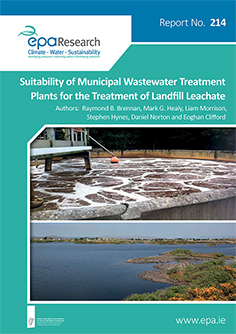Research 214: Suitability of Municipal Wastewater Treatment Plants for the Treatment of Landfill Leachate
Authors: Raymond B. Brennan, Mark G. Healy, Liam Morrison, Stephen Hynes, Daniel Norton and Eoghan Clifford
Summary: Research 214 on the Suitability of Municipal Wastewater Treatment Plants for the Treatment of Landfill Leachate

Identifying Pressures
In the last 30 years, there have been significant advances in waste and landfill management practices in response to European Union (EU) directives. These have led to changes in leachate composition, in the volumes of leachate produced and in its treatability. Furthermore, increasingly stringent wastewater discharge requirements mean that the co-treatment of leachate in municipal/urban wastewater treatment plants (UWWTPs) with other forms of wastewater can now be a challenge for some UWWTPs. Key challenges faced by UWWTP operators treating landfill leachate include high (i) ammonium-nitrogen concentrations in leachate and (ii) the increased cost of treating wastewater to increasingly stringent standards. It is anticipated that the requirement to meet these standards will drive UWWTP operators to consider their incoming load profile and the potential impacts on final standards that will be required. Meanwhile, increased costs, combined with concerns over leachate outlet security, are a significant challenge for landfill managers. In some cases, UWWTPs have ceased accepting leachate to comply with discharge licence requirements.
Informing Policy
The European Union (EU) Waste Management Act (1996), the Landfill Directive (1999/31/EC; EU, 2001a) and subsequent legislation have driven major changes in waste management in Ireland in the last 20 years, with the number of open municipal solid waste (MSW) landfills decreasing from 95 in 1995 to 4 in 2014 (EPA, 2014). However, leachate management is an area of growing concern for landfill and urban wastewater treatment plant (UWWTP) operators, as increasingly stringent water quality emission limits placed on UWWTPs by the Urban Wastewater Directive (91/271/EEC; EEC, 1991) and Water Framework Directive (2000/60/EC; EU, 2000) have resulted in increased costs associated with wastewater treatment. This report finds that although co-treatment of landfill leachate at UWWTPs may be appropriate in some circumstances, the inherent variability in leachate composition and treatability necessitates a conservative approach.
Developing Solutions
The study addressed a knowledge gap which existed regarding the suitability of UWWTPs for the treatment of landfill leachate. In addition the study examined the treatment of landfill leachate at landfill sites. Recommendations were made for wastewater treatment plants and landfills to have overlapping measurement requirements for common contaminants. The project developed a protocol for laboratory batch experiments, which can conducted before leachate is imported to a WWTP to estimate the appropriate loading rates. The study engaged with a wide range of stakeholders regarding leachate disposal routes and cost and recommended that nitrogen loading-based tariffs should be considered to give certainly to landfill operators considering the installation of on-site leachate treatment systems. This could provide a framework for sustainable development of leachate treatment infrastructure.
https://www.epa.ie/media/epa-2020/publications/research/EPA-RR-214_cov_20mm[1].jpg